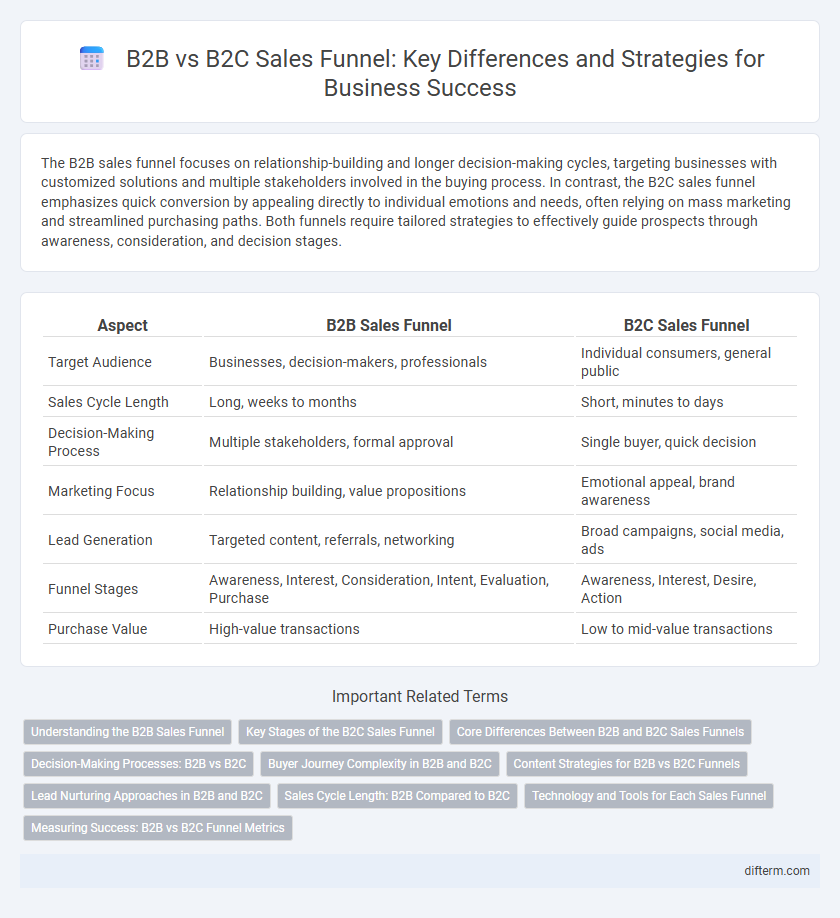The B2B sales funnel focuses on relationship-building and longer decision-making cycles, targeting businesses with customized solutions and multiple stakeholders involved in the buying process. In contrast, the B2C sales funnel emphasizes quick conversion by appealing directly to individual emotions and needs, often relying on mass marketing and streamlined purchasing paths. Both funnels require tailored strategies to effectively guide prospects through awareness, consideration, and decision stages.
Table of Comparison
| Aspect | B2B Sales Funnel | B2C Sales Funnel |
|---|---|---|
| Target Audience | Businesses, decision-makers, professionals | Individual consumers, general public |
| Sales Cycle Length | Long, weeks to months | Short, minutes to days |
| Decision-Making Process | Multiple stakeholders, formal approval | Single buyer, quick decision |
| Marketing Focus | Relationship building, value propositions | Emotional appeal, brand awareness |
| Lead Generation | Targeted content, referrals, networking | Broad campaigns, social media, ads |
| Funnel Stages | Awareness, Interest, Consideration, Intent, Evaluation, Purchase | Awareness, Interest, Desire, Action |
| Purchase Value | High-value transactions | Low to mid-value transactions |
Understanding the B2B Sales Funnel
The B2B sales funnel involves a complex decision-making process with multiple stakeholders and longer sales cycles compared to B2C funnels. Key stages in the B2B sales funnel include lead generation, lead nurturing, product evaluation, proposal submission, and contract negotiation. Effective management of each stage with targeted content and personalized communication enhances conversion rates and drives revenue growth.
Key Stages of the B2C Sales Funnel
The B2C sales funnel typically includes key stages such as Awareness, Interest, Desire, and Action, where consumers move from recognizing a need to completing a purchase. Emotional engagement and convenience play significant roles in driving conversions, with strategies like targeted advertising and simplified checkout processes optimizing each stage. Understanding consumer behavior and personalized marketing are essential for maximizing the effectiveness of the B2C sales funnel.
Core Differences Between B2B and B2C Sales Funnels
B2B sales funnels feature longer decision-making processes, with multiple stakeholders involved in purchases often driven by business needs and ROI analysis. B2C sales funnels prioritize faster conversions, focusing on emotional triggers and individual consumer preferences to drive impulse buying and brand loyalty. The core difference lies in complexity and buyer motivation: B2B relies on relationship-building and detailed product information, whereas B2C emphasizes immediate value and user experience.
Decision-Making Processes: B2B vs B2C
B2B sales funnels involve a complex decision-making process with multiple stakeholders, including managers, procurement teams, and executives, prioritizing ROI, long-term value, and risk mitigation. In contrast, B2C sales funnels typically feature individual consumers making quicker, emotion-driven purchases influenced by personal preferences and immediate needs. Understanding these distinct decision-making dynamics is crucial for tailoring marketing strategies and sales approaches to effectively engage each audience.
Buyer Journey Complexity in B2B and B2C
B2B sales funnels involve a more complex buyer journey due to multiple stakeholders, longer decision-making processes, and higher-value transactions, requiring tailored content and relationship-building strategies. In contrast, B2C sales funnels typically feature simpler, faster buyer journeys driven by individual consumers with emotional and immediate purchase motivations. Businesses must adapt their sales approaches to these differences to optimize conversion rates and customer retention.
Content Strategies for B2B vs B2C Funnels
B2B sales funnels emphasize educational and solution-oriented content such as whitepapers, case studies, and webinars, targeting decision-makers who require detailed information before purchasing. B2C sales funnels leverage emotionally-driven, visually engaging content including social media ads, videos, and influencer endorsements to attract and convert individual consumers quickly. Tailoring content strategies to the specific buyer journey and decision-making process in each funnel enhances engagement and conversion rates effectively.
Lead Nurturing Approaches in B2B and B2C
B2B sales funnels rely heavily on personalized lead nurturing approaches involving account-based marketing, targeted content, and multi-touch engagements to guide prospects through longer decision cycles. B2C lead nurturing emphasizes quick, emotionally driven interactions with automated emails, retargeting ads, and social proof to accelerate buyer decisions. Effective lead nurturing in B2B prioritizes relationship building and education, while B2C focuses on impulse and convenience to convert leads faster.
Sales Cycle Length: B2B Compared to B2C
B2B sales funnels typically feature longer sales cycles, often lasting several months due to complex decision-making processes involving multiple stakeholders. In contrast, B2C sales funnels are shorter, frequently concluding within days or weeks as individual consumers make quicker purchasing decisions. Understanding these differences is crucial for designing tailored marketing strategies that align with the unique timelines and buyer behaviors in each market segment.
Technology and Tools for Each Sales Funnel
B2B sales funnels heavily rely on customer relationship management (CRM) systems, marketing automation platforms, and lead scoring tools to manage complex buying cycles and multiple stakeholders effectively. In contrast, B2C sales funnels prioritize e-commerce platforms, social media marketing tools, and personalization engines to drive quick conversions and enhance the consumer experience. Both funnels benefit from analytics software to track performance and optimize strategies, but the technology stack varies significantly based on target audience behavior and sales process duration.
Measuring Success: B2B vs B2C Funnel Metrics
B2B sales funnels prioritize metrics such as lead quality, conversion rates at each stage, and average contract value, reflecting longer sales cycles and relationship-driven purchases. B2C funnels focus more on volume-based metrics like website traffic, bounce rates, and average order value, emphasizing quick transactions and high customer turnover. Understanding these differences enables businesses to tailor their measurement strategies for more accurate performance analysis and effective resource allocation.
B2B sales funnel vs B2C sales funnel Infographic

 difterm.com
difterm.com